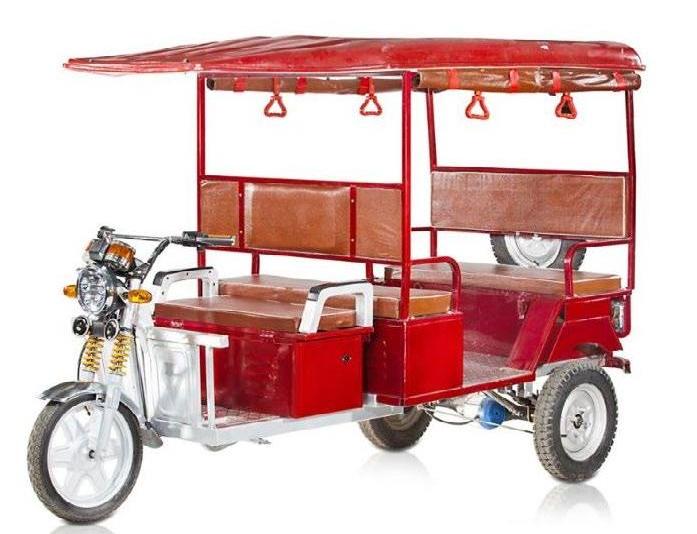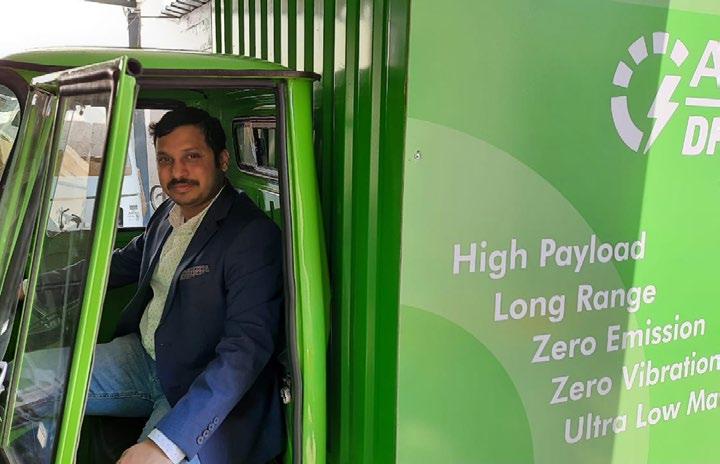
8 minute read
EV Updates
Zero Emission Solar Powered EV Charging Station Developed at IISc Bangalore
GreenEnco under the IfCA programme of the Energy System Catapult, UK, has developed a solar PV powered EV charging station at IISc, Bangalore UK-based GreenEnco under the Innovating for Clean Air (IfCA) programme of the Energy System Catapult, UK, has developed a solar PV powered electric vehicle (EV) charging station at the Indian Institute of Science (IISc) in Bangalore.
Advertisement
The custom-made off-grid system comprises a solar photovoltaic (PV) module, hybrid inverter, battery storage and an EV charger. It has been revealed that the project was taken up under the Indo-UK collaboration to fight against climate change, as the IfCA programme aims to support Indian and British firms in curbing pollution at the source in Bangalore.
The charging point is located at the JRD Tata Memorial library on the campus, with solar panels on the library's rooftop. Vikram Solar has supplied its prospective building modules while Italian firm Fimer provided the inverter, battery storage and EV charger. "The zero-emission EV charging station powered by solar cells has been designed and developed at our sustainable transportation lab by the UK-based GreenEnco Ltd under the Innovating for Clean Air (IfCA) programme of the Energy System Catapult, UK," an IISc official informed in a statement. As a renewable energy advisory firm, GreenEnco provides strategic and risk management consulting services across the solar PV project lifecycle, energy storage and zero-emission infrastructure projects. "An impact assessment of the charging facility will be conducted at the lab with GreenEnco's support under convenor Ashish Verma's supervision," the official continued. The sustainable transportation lab at IISc was set up to contribute to research and teaching in transportation systems engineering (TSE). The areas of interest of the lab include sustainable transportation planning and policy, integrated public transport and management, quality of life and climate change. Solar powered EV charging stations are one of the most attractive possibilities from the decarbonisation of transportation, as this will take care of one of the biggest challenges for EV’s, as far as detractors go. Avoiding power created using fossil fuels.
Earlier this month, the “ChargeGrid Flare” street lamp integrated EV chargers, a unique initiative by HPCL and Magenta, was launched at HPCL Bandra Kurla Complex outlet in Mumbai and Nitimarg T&E outlet in Delhi. This class of electric vehicle (EV) charging points are first in India, to incorporate within energy-efficient street lamp columns, which will encourage EV adoption for flexible and low-cost charging solutions.
Sterling and Wilson To Launch EV Charging Infrastructure, Partners With Enel X
Engineering, procurement, and construction (EPC) major, Sterling and Wilson will soon be entering the Indian electric mobility segment with the launch of electric vehicle (EV) charging infrastructure. The company has announced its 50-50 partnership with Enel X, a subsidiary of Enel Group, innovative products, and digital energy solutions provider, to make the move into e-mobility.
This joint venture endeavors to boost the private e-mobility ecosystem by providing worldclass products and software platforms to support the EV charging infrastructure build-up across the country. The joint venture between Sterling and Wilson and Enel X will be incorporated on April 1, 2021, and will start operating from the second quarter of 2021.
Speaking on their new venture, the CEO of Sterling Generators, Sanjay Jadhav stated, “As part of our commitment to sustainability, we are happy to announce our entry into the electric mobility segment through a joint venture with Enel X, providing end-to-end services for electric vehicle charging stations across India."
Explaining how EV charging will help to fight climate changes, Sanjay added, "The quick electric charger will be a game-changer for the EV sector in the country and is in line with the national vision to combat fossil fuel pollution and associated climate change through accelerated electrification of private and public transportation as a prime lever. The JV will help create direct and indirect employment through local manufacturing and operations & maintenance services of the charging infrastructure.”
For both SWPL and Enel X the move is a key aspect of their efforts to benefit from India’s EVtransition, and bring to market ENEL’s latest electric vehicle chargers.
Recounting the partnership, “This partnership represents an important step forward in our energy transition strategy. We are leading the spread of electric mobility in several global markets, including Europe and North America and we are thrilled to work with Sterling and Wilson, marking our entry into the Indian market," said Francesco Venturini, Enel X CEO. "We will support the JV by bringing electric mobility solutions to market that are fit for local needs, accessible, and convenient for all drivers, significantly contributing to the decarbonization of the transport sector across India and subsequently South East Asia," he further added.
Indian E-Rickshaw Market to Expand to $1.39 Billion by 2025: Report
India witnessed an exponential growth of electric rickshaws (e-rickshaw) since they first entered the Indian public transportation network. An E-rickshaw has always been an easy to go and cheaper option for the short-distance daily commute. Their cost effectiveness has also made e-rickshaw the preferred option for an ever larger section of society.
Now, according to a recent report titled, 'India Electric Rickshaw Market' by Prescient & Strategic Intelligence, the Indian e-rickshaw market is expected to grow exponentially and reach a market value of USD 1,394.2 million by 2025, advancing at a CAGR of 33.3 percent during the forecast period (2020–2025). In 2019, it was at USD 786.2 million.
That immense growth is the result of a growing acknowledgement of the advantages these e-rickshaws bring, in terms of cost of ownership and maintainance, which has led to increasing incentives by the government and moves by manufacturers for the design and development of more efficient and affordable rickshaws.
However, Covid-19 has impacted the unorganized and local players operating in the market severely. It is also estimated that 30 percent of these manufacturers/ assemblers will permanently shut down their business post Covid-19. The sales figures are expected to reach the 2019 level in 2022, with the market gradually recovering thereafter, according to the report.
The report suggest that the changing dynamics between India and China have also been propelling the localization of e-rickshaw manufacturing in India itself. This may cause an increase of 8-10 percent in the price of passenger e-rickshaws in a short term. Consequently, the share of load carrier e-rickshaws is projected to increase significantly during the forecast period, on account of the need for the last-mile transportation of logistic goods, including fruits and vegetables.
According to the report, passenger carriers dominated the Indian electric rickshaw market during 2014–2019 and are expected to continue covering a larger market share, in terms of both value and volume, in the future too. The market for this category is also driven by the rapidly increasing urban population in the country.
Additionally, the report tells how Delhi was the largest market for e-rickshaws during 2014-2019. As the sales of e-rickshaws have picked up here since 2013, in response to the increasing levels of air pollution in the capital, the Delhi government has also announced a subsidy of INR 30,000 on the purchase of e-rickshaws. This, in turn, has led to the increase in their demand in the city, further benefitting the market.
During that period, rickshaws of 1,000–1,500 watt, motor power contributed the largest revenue to the Indian e-rickshaw market, accounting for more than 50 percent in 2019. This can be ascribed to the optimum benefit–cost ratio offered by these vehicles.

There was one more reason that elevated the e-rikshaw market, and that is the unorganized category, lack of a regulatory framework, the availability of lowcost electric rickshaws, and their less complex powertrain.
Interestingly, Uttar Pradesh is expected to be the largest e-rickshaw market in India during forecast period of 2020-2025, primarily due to the growing demand for these rickshaws in Tier-1 cities, Tier-2 cities, and the ruralurban periphery. Besides, other states such as Bihar, West Bengal, and Assam are witnessing a significant demand for these rickshaws.
COGOS to Deploy 1000 EVs in its Logistics Fleet, Partners With Altigreen

Prasad Sreeram, Founder & CEO, COGOS with the brand new EV fleet
Intra-city logistics company, COGOS has announced its partnership with Altigreen by deploying 1000 EVs in its fleet, a step to further strengthen its commitment towards electric mobility in the country.
The partnership has materialised at an opportune time as the budget 2021 and the later impositions of green tax and new scrap policy, extensively showed the government’s intent to enhance EV adoption in India. COGOS would initially operate across all metros in India including Bangalore, New Delhi, Mumbai, Pune, Hyderabad, and Kolkata, before expanding to Tier 1 and 2 cities.
COGOS plans to bring in at least 30 percent of its revenue from green technologies by 2023 and this agreement paves the path to reach their sustainable goals. COGOS will provide multiple offerings including a scalable, sustainable, and cost-efficient solution to its end users. With a load capacity and enhanced range that compares well with existing ICE options, COGOS will give customers a significant edge in efficient and responsible distribution and last-mile delivery solutions.
Prasad Sreeram, Founder and CEO of COGOS said “we are very excited about this partnership because Altigreen exemplifies our collective vision of the Future of Mobility – to create a sustainable ecosystem that transforms the logistics industry with the right R&D and support the Make in India initiative. Altigreen indigenously developed this product with many global patents to its kitty.”
“With the growing demand for last-mile services in India, we believe electric vehicles provide an ideal long-term solution for the emerging imperatives around sustainability and cost-effectiveness. We will continue to transform city logistics with our tech platform which has improved the service levels and efficacy of Enterprises and Transporters. Now with EV, we are bringing in world-class renewable technologies to the city logistics play to further our mission to make Atmanirbhar Bharat,” he further added. COGOS Altigreen EVs
In Phase 1, COGOS is focused on deploying a fleet of 1,000 vehicles. The initial focus will be on three-wheeler cargo applications and the company will primarily utilise Altigreen three and fourwheelers that are custom-designed with high-quality components and custom-built software that delivers high energyefficiency and long life.










